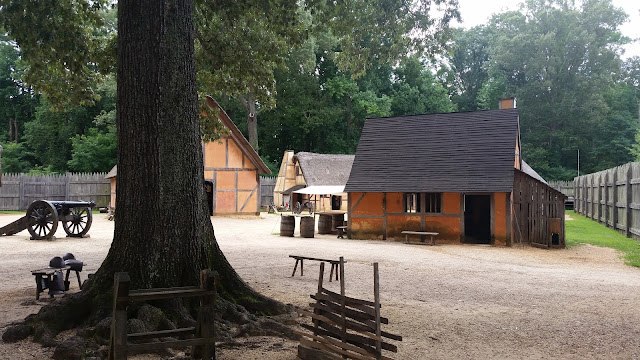 |
| Recreated James Fort Interior |
1607-1609 | 1610-1615 | 1616-1620 | 1620-1624
Virginia's history was documented in the 1500s by explorers, but it did not exist until the admittedly shaky establishment of Jamestown as a colony in 1607. Chief Powhatan's consolidationo of his many tribes in 1580 was a very important event when it came to the English landing at Jamestown in 1607. The Spanish left their marks and the English tried once before with Roanoke. But, it all leads to the landing of the Susan Constant, the Godspeed, and the Discovery at Jamestown in 1607.
Many historic events occurred since that time, including a Civil War, weather disasters such as Hurricane Camille, and the building of traditions such as the Virginia Ham, which originated in Jamestown.
Notable individuals and secondary individuals led the colony into statehood between 1607 and today. Eight presidents emerged from Virginia's soil, more presidents than from any other state. The ordinary citizen also made marks. Consider William Teller, son of two of the first enslaved Black African individuals to arrive in the colony in 1619. He was named for his parents' master, Captain William Teller. Or take Myrta Lockett Avary, the wife of a confederate officer who kept a record of her experiences in the Civil War years between 1861-1865.
We all make a little history every day.
Resources
The following pages are taking some time to build, but the resources can be invaluable for individuals who want to learn more about Virginia's history and its individuals. The resources can help history students and family historians to create individual stories based upon fact, not family myths. Plus, the genealogical research at Wikitree lends a hand to lineages and historical events.
The events and names are broken into periods. The first is the Settlement Period from 1607-1624. This is the era when Virginia's first settlements, churches, parishes, and forts were developed. This period concerns the establishment of Jamestown and the three other commnities of Henrico, Charles City, and the town that would become Hampton. These settlements didn't take into consideration the land ownerships among the "Hundred" acreages such as Bermuda Hundred or Flowerdew Hundred. These acres became plantations that contributed to our histories as well.
If you have questions about any event or person you find on these pages, you can reach me, Linda Goin, with a message at my Wikitree page.
Comments
Post a Comment
Your comment is under moderation and will show as soon as approved.